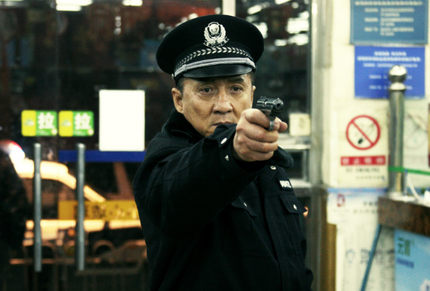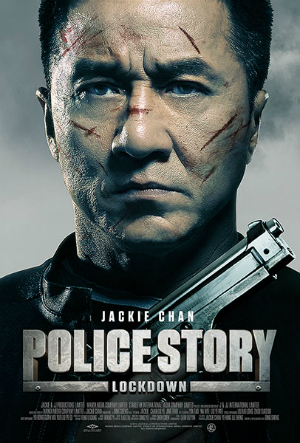Review: POLICE STORY: LOCKDOWN, Another Jackie Chan Letdown

A sequel in name only to Jackie Chan's hugely popular action series, this latest offering moves proceedings to mainland China for a small scale, straight-faced and relatively thrill-free drama with a tendency to pontificate about civil responsibility.
Jackie Chan's Police Story films remain some of the actor's most entertaining and successful work, notorious for their frenetic pacing and jaw-dropping stunt work to this day. While 2004's New Police Story saw things take a turn towards more straight-up drama, this fifth entry in the series hardly seems to belong at all.
For starters Chan plays a totally new character, Police Captain Zhong Wen, a sullen downtrodden law enforcer reeling from the recent death of his wife. Summoned to a nightclub by his estranged daughter, Miao Miao (Jing Tian - recently seen opposite Donnie Yen in Special ID) Zhong unwittingly becomes embroiled in a hostage crisis when the club's owner, Wu Jiang (Liu Ye) locks the doors and takes his guests captive.
Complicating matters, Wu is also Miao Miao's new boyfriend, a coupling Zhong disapproves of wholeheartedly, but that soon becomes a moot point as Wu's plan unfolds. After demanding the release of a convicted murderer, Wu's hostages soon realise they all know each other and that their captor's real motives point to a single tragic event in their collective past.
The set-up is decent, but noticeably low-key compared to earlier films in the series. Approaching the material as "Die Hard in a nightclub", the film has the potential for weighty, high-tension stand-offs, but few opportunities for large scale stunts. As a result, there are a number of tenuously-related flashbacks featuring car chases, punch-ups and shootouts to keep audiences engaged, but even they feel like director Ding Sheng is compensating for his primary narrative, while also firing at a smaller calibre than anticipated.
Along the way, Zhong is called upon by the other hostages to restore law and order, but to do so in a manner that is just and righteous. When Wu's ulterior motives are eventually exposed, almost every character on screen is held accountable for some form of corruption, immorality or otherwise irresponsible behaviour that must be addressed, confessed to and appropriately atoned for before the night is out.

Jackie Chan has been very vocal in recent years about his desire to dial down his action roles and assert himself as more of a purely dramatic performer, as well as further ingratiate himself with mainland audiences and investors - sometimes to the disdain of his Hong Kong fans. While his last film, CZ12: Chinese Zodiac was relentlessly insufferable it proved a monster hit at the Chinese box office and did include moments of innovative stunt work, despite his earlier proclamations.
No such luck in Police Story: Lockdown. Chan leaves almost all of the fighting (what little there is) to other characters, and actually loses his only real scuffle. There is very little bona fide martial arts anywhere in the film - save for a rather baffling flashback in an underground Muay Thai club. Nor do we see much classic Chan stunt work, other than a brief rooftop altercation that never threatens to raise the pulse. Nope, Chan really wants to be taken seriously here. Zhong is a depressed, mournful individual, a confessed bad father, who quite possibly should not be on active duty. Most of the time, Chan just looks like a sad puppy.
Elsewhere, the only characters given any kind of breathing space are Liu Ye's crusading villain and Jing Tian's stroppy daughter, and there's little effort to let either of them grow into anything more profound or substantial. Wu's plan never really makes sense, and is almost inconceivable to execute, while Miao Miao flips implausibly from adolescent rebel to saccharine sweet daddy's girl the moment shit gets real.
Ding Sheng previously collaborated with Chan on Little Big Soldier, a genuine highlight of the actor's recent output, and here is credited as writer, editor and director. Perhaps in an effort to inject some energy into the film, Ding employs plenty of shaky-cam and rapid-fire editing, even during simple dialogue scenes (of which there are many), which are more likely to induce nausea than excitement in his audience.
Police Story: Lockdown has proved another monster hit on the mainland, where it was released in 3D and IMAX versions and scored Chan his biggest opening day ever. Hong Kong gets only a standard 2D Cantonese-dubbed release, which goes some way to highlighting how little confidence local distributor Emperor Motion Pictures has in the film, while the content and themes illustrate that Chan knows his audience - and it's not us.
As a result, audiences approaching the film as the latest instalment in the Police Story franchise stand to be sorely disappointed. However, for those keen to watch a dour-faced Chan mope around an empty nightclub while Liu Ye lectures people on their civil responsibilities, Jackie will be more than happy to take your cash.
Review originally published in connection with the film's theatrical release in Asia in January 2014, when it was titled Police Story 2013. It opens in select theaters in the U.S. on Friday, June 5, and will also be available via various Video On Demand platforms.

Do you feel this content is inappropriate or infringes upon your rights? Click here to report it, or see our DMCA policy.






